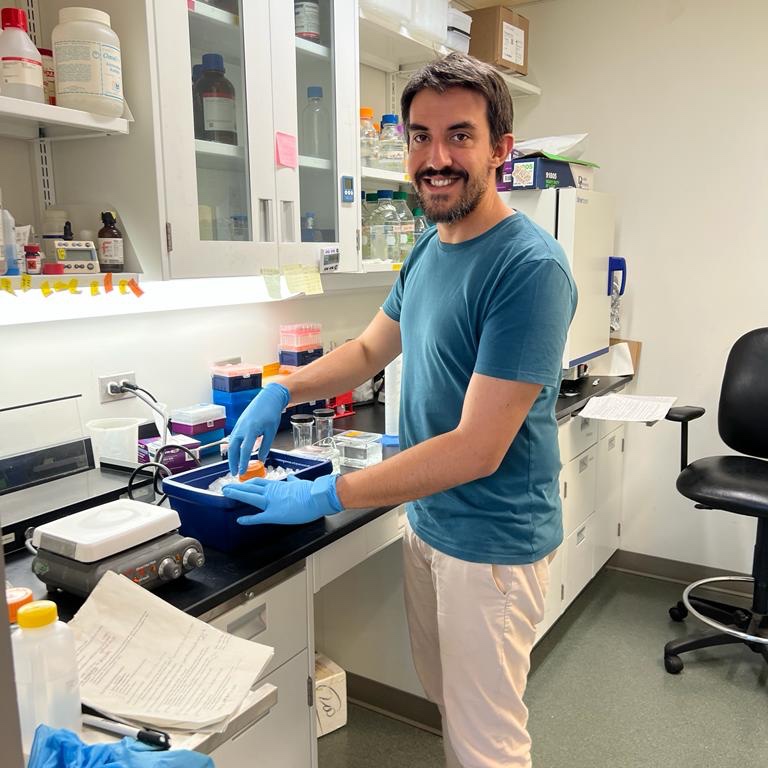About This Project
Compost has been used for decades to fertilize soils. However, it has been demonstrated that plants treated with compost have a more diverse and rich root microbiota (Heisey et al.), and its potential role in supporting and protecting plants from stresses remains unexplored. This project uses metatranscriptomics to understand the genetic pathways active in compost microbiota that help the plant during drought. These data will be compared with the genetic response of the plants.
Ask the Scientists
Join The DiscussionWhat is the context of this research?
Plants have established many interactions with soil microorganisms during their evolution (Delaux et al. 2013). Most of these interactions between plants and soil bacteria are in the rhizosphere, the tiny layer of soil surrounding the roots. In this environment, plants select bacterial species to interact with by releasing molecules that can attract specific species. These bacterial groups interacting with the root can be considered the plant microbiota. These bacteria have beneficial effects on the plant (Santoyo et al. 2021): they increase plant nutrition, protect plants from pathogens, and help plants face environmental stresses, such as drought stress, as we demonstrated in previous experiments using compost as a biofertilizer. These effects result from an interaction among bacterial species, with a reciprocal influence of genetic network activation. These molecular interactions are still not clear, as they involve many species at the same time.
What is the significance of this project?
The knowledge of the genetic mechanisms activated during plant-microbes interaction is crucial for a complete understanding of this important relationship for plant health. Applying the new metatranscriptomic technique will open a window on these molecular interactions. The data generated by these experiments will permit us to identify genes activated in the different bacterial species and in the plant, producing a complete picture of this relationship. These data will be open source to allow other scientists to use them. These data will help us and other researchers to understand the genetic mechanisms underlying the beneficial effect of plant microbiota, leveraging these data to design sustainable agriculture practices that use microbes to improve plant health.
What are the goals of the project?
I plan to cultivate tomato plants with compost and chemical fertilizer, to discriminate only the effect of microbiota. Half of each set of plants will be fully hydrated, and the other half will undergo drought stress for 2 weeks to stimulate a response of the root microbiota. Each condition will have 5 replicates, for a total of 20 plants. Plant health parameters such as photosynthetic efficiency, plant height, and virtual biomass will be regularly measured and used to provide an overview of the plant physiological state. After 2 weeks, the rhizosphere will be collected. Samples of soil and leaves will also be frozen for long-term storage and future analysis. From each rhizosphere sample, the RNA will be extracted by us and sequenced by a company. Analyzing the rhizosphere functions and correlating them with the phenotypic and molecular response of the plants will help us clarifying if and how the interaction with the microorganisms is beneficial for the plants under stress conditions.
Budget
Metatranscriptomics is an innovative technique based on the high-throughput sequencing of environmental RNA. Differently from regular transcriptomics, it allows the identification of active genes from a group of organisms, like the compost microbiota associated with the roots. This allows us to describe the complete scenario of the active metabolic and biochemical pathways in bacteria during the interaction with the plant root in drought situations. The technique is now less expensive than in the past, permitting the analysis of samples with sufficient biological replicates to produce a robust output.
The budget comprises the analysis of samples of rhizosphere of tomato plants grown with compost and plants grown without compost (control). The nutrient amount will be balanced with a chemical fertilizer for plants without compost, as common in traditional agriculture. The rest of the budget (500$) will be spent for experimental activity (extraction kits, plastics, etc).
Endorsed by
 Project Timeline
Project Timeline
This project has a reasonable duration of 1 year. The most time-consuming part will be data analysis, given the large amount of data generated by metatranscriptomics.
The first part of the experiment will be constrained by selecting a good population of plants without mutations and quite homogeneous in growth, also because it will be necessary to wait until plants' sexual maturity before administering water stress (3 weeks). Master students will be involved in taking care of the plants.
Mar 17, 2025
Project Launched
Jun 01, 2025
Tomato seeds will be sterilized to enhance and synchronize germination. The plantlets will germinate in vitro and then transferred in pots after one week of growth
Jul 15, 2025
After 3 weeks, we will start with the drought stress but also we will measure some physiological parameters of the plant for all the duration of the experiment
Aug 31, 2025
Water will be administered in defined quantities to each experimental group, and after two weeks rhizosphere, leaves and roots will be sampled
Nov 30, 2025
The RNA coming from the rhizosphere samples of the plants after drought stress will be extracted and sent to the sequencing company
Meet the Team
Team Bio
We met as researchers in 2023, when we started working on this new project in collaboration with a local company. Sebastiano has many years of experience in the field of plant-microorganisms interactions and Rosalba could help with data analysis of communities and with lab work. Together, we believe that it is possible to realize a concrete solution that not only raises awareness but also helps farmers reduce soil biodiversity loss by improving plant growth, health and yield at the same time.
Rosalba Cipriani
I earned my Molecular Biology degree in Padova (Italy), and being born in the countryside helped me to have a closer look to the modern agricultural practices and to understand the urgent need of innovation and sustainability in land management, especially in the actual conditions of water and soil pollution and biodiversity loss. Therefore, in the last years I became really fond of exploring new techniques and approaches to tackle this problem. My PhD project is in collaboration with a company that deals with the collection and the transformation of waste and that produces compost, which has been traditionally used as a soil amendment for its organic matter and nutrient content and it seems to be one of the most promising solutions to the loss of soil biodiversity caused by anthropogenic activities. However, the investigation of the role of its microbiota in helping plant growth and health is still missing.
Thus, my aim is to characterize the community of microorganisms present in compost, and during my 1st year of PhD I demonstrated that the addition of compost to a soil poor of nutrients enriches the rhizosphere of tomato plants with beneficial PGPR, compared to plants treated with sterilized compost and a chemical fertilizer. Among these bacteria, I discovered that some of them were involved in stress response, so I set up a drought stress experiment with plants in different soil treatments, confirming that compost-treated plants had higher photosynthetic efficiency compared to the other conditions.
Adding data regarding metatranscriptomics would help my work by completing the picture of the functional role of bacteria in different compartments of the plant, also thanks to the experience in bioinformatics I gained until now. This will be really significant to pave the way for manipulating compost microbiota and plan concrete interventions in the field.
I presented my work at some congresses of Italian Botanical Society (SBI) and at MiCROPe in Vienna (2024).
Sebastiano Nigris
Since I was a child, I have been fascinated by plants, and by what plants represent for humankind: food, protection, tradition, medicin, and much more.
During my career, I got the opportunity to study the relationship between plants and microorganisms. This gave me the chance to understand that we should consider plants together with their microscopic symbionts to really understand plant biology. These beneficial relationships might help us to face environmental issues, such us global warming, drought, floodings. I dream a world with a more green agriculture, that takes advantage of beneficial microbes to reduce the impact on environment.
My professional goal is to train, inspire, and mentor young scientists to explore their own research ideas, with new approaches, modern techniques and thinking outside the box.
Lab Notes
Nothing posted yet.
Project Backers
- 0Backers
- 0%Funded
- $0Total Donations
- $0Average Donation


